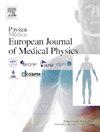Enhancing MRI brain tumor classification: A comprehensive approach integrating real-life scenario simulation and augmentation techniques
IF 3.3
3区 医学
Q1 RADIOLOGY, NUCLEAR MEDICINE & MEDICAL IMAGING
Physica Medica-European Journal of Medical Physics
Pub Date : 2024-11-01
DOI:10.1016/j.ejmp.2024.104841
引用次数: 0
Abstract
Brain cancer poses a significant global health challenge, with mortality rates showing a concerning surge over recent decades. The incidence of brain cancer-related mortality has risen from 140,000 to 250,000, accompanied by a doubling in new diagnoses from 175,000 to 350,000. In response, magnetic resonance imaging (MRI) has emerged as a pivotal diagnostic tool, facilitating early detection and treatment planning. However, the translation of deep learning approaches to brain cancer diagnosis faces a critical obstacle: the scarcity of public clinical datasets reflecting real-world complexities. This study aims to bridge this gap through a comprehensive exploration and augmentation of training data. Initially, a battery of pre-trained deep models undergoes evaluation on a main brain cancer MRI “BT-MRI” dataset, yielding remarkable performance metrics, including 100% accuracy, precision, recall, and F1-Score, substantiated by the Score-CAM methodology. This initial success underscores the potential of deep learning in brain cancer diagnosis. Subsequently, the model’s efficacy undergoes further scrutiny using a supplementary brain cancer MRI “BCD-MRI” dataset, affirming its robustness and applicability across diverse datasets. However, the ultimate litmus test lies in confronting the model with synthetic testing datasets crafted to emulate real-world scenarios. The synthetic testing datasets, a BCD-MRI testing sub-dataset enriched with noise, blur, and simulated patient motion, reveal a sobering reality: the model’s performance plummets, exposing inherent limitations in generalization. To address this issue, a diverse set of optimization strategies and augmentation techniques, ranging from diverse optimizers to sophisticated data augmentation methods, are exhaustively explored. Despite these efforts, the problem of generalization persists. The breakthrough emerges with the integration of noise and blur as augmentation techniques during the training process. Leveraging Gaussian noise and Gaussian blur kernels, the model undergoes a transformative evolution, exhibiting newfound robustness and resilience. Retesting the refined model against the challenging synthetic datasets reveals a remarkable transformation, with performance metrics witnessing a notable ascent. This achievement underscores the important role of correct selection of data augmentation in fortifying the generalization of deep learning models for brain cancer diagnosis. This study not only advances the frontiers of diagnostic precision in brain cancer but also underscores the paramount importance of methodological rigor and innovation in confronting the complexities of real-world clinical scenarios.
增强磁共振成像脑肿瘤分类:整合真实场景模拟和增强技术的综合方法。
脑癌对全球健康构成了重大挑战,近几十年来,死亡率急剧上升,令人担忧。与脑癌相关的死亡率已从 14 万上升到 25 万,新诊断病例也从 17.5 万增加到 35 万,翻了一番。为此,磁共振成像(MRI)已成为一种关键的诊断工具,有助于早期检测和治疗规划。然而,将深度学习方法应用于脑癌诊断面临着一个关键障碍:反映真实世界复杂性的公共临床数据集非常稀缺。本研究旨在通过全面探索和增强训练数据来弥补这一差距。最初,一组预先训练好的深度模型在一个主要的脑癌磁共振成像(MRI)"BT-MRI "数据集上进行了评估,获得了显著的性能指标,包括 100% 的准确率、精确度、召回率和 F1 分数,并通过 Score-CAM 方法得到证实。这一初步成功彰显了深度学习在脑癌诊断中的潜力。随后,利用补充脑癌 MRI "BCD-MRI "数据集对该模型的功效进行了进一步检查,肯定了其在不同数据集上的鲁棒性和适用性。不过,最终的试金石还在于用模拟真实世界场景的合成测试数据集来检验该模型。合成测试数据集是一个 BCD-MRI 测试子数据集,富含噪声、模糊和模拟患者运动,它揭示了一个令人警醒的现实:模型的性能急剧下降,暴露了泛化的固有局限性。为了解决这个问题,人们对各种优化策略和增强技术进行了详尽的探索,从多样化的优化器到复杂的数据增强方法,不一而足。尽管做出了这些努力,但通用化问题依然存在。在训练过程中,将噪声和模糊作为增强技术进行整合,就出现了突破。利用高斯噪声和高斯模糊核,模型发生了变革性的演变,表现出新发现的鲁棒性和弹性。针对具有挑战性的合成数据集对改进后的模型进行重新测试,结果显示模型发生了显著的转变,性能指标明显上升。这一成就强调了正确选择数据增强在强化深度学习模型在脑癌诊断中的泛化方面的重要作用。这项研究不仅推动了脑癌精准诊断的前沿发展,还强调了方法论的严谨性和创新性在面对现实世界复杂临床场景时的极端重要性。
本文章由计算机程序翻译,如有差异,请以英文原文为准。
求助全文
约1分钟内获得全文
求助全文
来源期刊
CiteScore
6.80
自引率
14.70%
发文量
493
审稿时长
78 days
期刊介绍:
Physica Medica, European Journal of Medical Physics, publishing with Elsevier from 2007, provides an international forum for research and reviews on the following main topics:
Medical Imaging
Radiation Therapy
Radiation Protection
Measuring Systems and Signal Processing
Education and training in Medical Physics
Professional issues in Medical Physics.

 求助内容:
求助内容: 应助结果提醒方式:
应助结果提醒方式:


